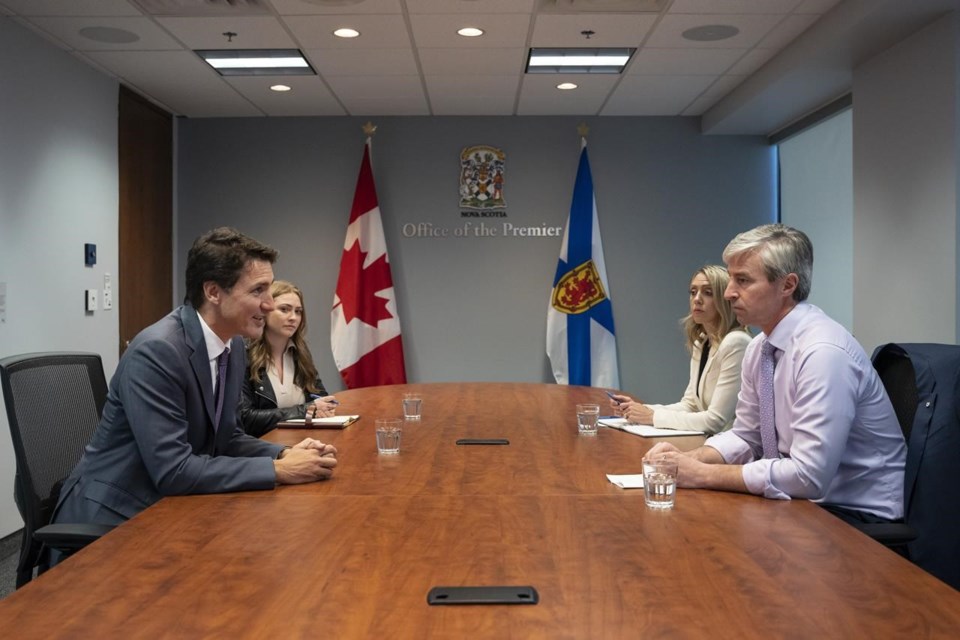HALIFAX — Nova Scotia's health minister says she has no problem with Ottawa holding the province accountable for how it will spend additional health-care money it will receive through a bilateral side deal announced Friday.
Michelle Thompson made the comment after Prime Minister Justin Trudeau confirmed that health agreements had been agreed to in principle by all four Atlantic provinces and Ontario. Trudeau said each deal will include data tracking to make sure the money is spent wisely.
"We just put forward close to $200 billion on the table (earlier this month) for the provinces to ensure that we are making tangible improvements in health-care outcomes for Canadians," the prime minister told reporters during visit to Dalhousie University in Halifax, where he took part in a town hall discussion.
"Making announcements about billions of dollars more for health care doesn't actually tell whether you're getting better results. That's why these negotiations are focused on showing the actual outcomes improving for Canadians."
Newfoundland and Labrador will get $2.17 billion in federal funding over 10 years, including $749 million through a new bilateral agreement. Premier Andrew Furey, who is also an orthopedic surgeon, issued a statement saying he sees the challenges within the health-care first-hand.
"In Newfoundland and Labrador, we have a plan to improve the system, and it aligns with the shared priorities outlined by our federal government," he said. "Increased federal funding is necessary to help us modernize our health-care system and better deliver care."
Meanwhile, Prince Edward Island's deal is worth $996 million, including $288 million in a one-on-one agreement. In an emailed statement, Premier Dennis King said, "This funding will be instrumental in enhancing and innovating our health-care system, to provide better access to health care for Island patients and a more collaborative model of service delivery for those health-care professionals within our system."
New Brunswick did not release any information about its agreement with Ottawa.
In Nova Scotia's case, the province will be receiving additional funding worth $1 billion over the next 10 years, having negotiated a deal specifically aimed at meeting the province's health-care priorities. Thompson said accountability for how the money will be spent is part of the deal.
"It's not unusual for bilateral agreements to come with some strings attached," Thompson told a virtual news conference, adding that the province's own accountability metrics will be posted on its Action for Health website. "We're happy to be accountable to the federal government about how we're using those funds."
At one point, Trudeau was asked about the tragic case of 37-year-old Allison Holthoff, the Nova Scotia woman who died in hospital on New Year's Eve after a seven-hour wait to see a doctor. On Wednesday, her family announced it was suing the province's health authority.
"The situation is heartbreaking," Trudeau said.
"I think Canadians are rightly proud of having a universal health-care system, but also very aware that the system is not living up to people's expectations. Tragic stories like this should not be happening."
As of Feb. 1, 133,595 Nova Scotians had registered on a provincial government website that is supposed to keep track of how many residents are looking for a family doctor. That number has grown steadily over the years, even though the Progressive Conservative government led by Premier Tim Houston was elected largely on a promise to fix that problem.
Thompson did not have any specific examples of how the new money will be spent, but she said the province's priorities include recruiting and retaining health-care workers, reducing surgical backlogs, improving data sharing and investing more in mental health and addictions programs, and in long-term care.
"We will always ask for more," she said when asked if the funding bump was enough. "We will use it to accelerate our actions, which you'll hear more about in our budget in the coming weeks."
The new funding is part of a $198.6-billion investment by the federal government to improve health-care services, including $46.2 billion in new funding announced earlier this month.
Trudeau said the new side deals are based on the success of the federal government's previous federal-provincial agreements on $10-a-day child care.
"We know that different provinces across the country have very different approaches to delivering child care," he said. "That involved negotiating directly with different jurisdictions according to their requirements."
Trudeau stressed that it was up to the provinces to devise ways to implement their health-care plans.
"We have a similar approach with health care," he said. "We're looking for ambitious targets that are reasonable for them .... The targets and the metrics will be negotiated, province by province."
As the new bilateral deals are just agreements in principle, work will soon begin on three-year agreements that will include specific targets and deadlines, the federal government said in a statement. Ottawa said it will work with Nova Scotia, for example, to streamline foreign credential recognition for internationally educated health professionals and improve labour mobility for health workers, among other things.
This report by The Canadian Press was first published Feb. 23, 2023.
Michael MacDonald, The Canadian Press


